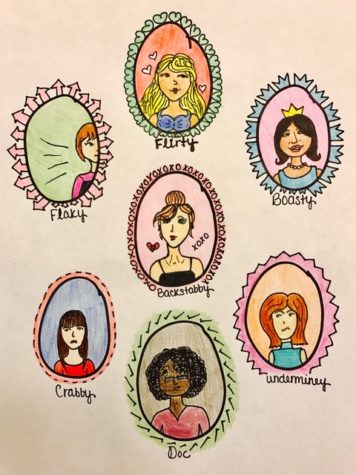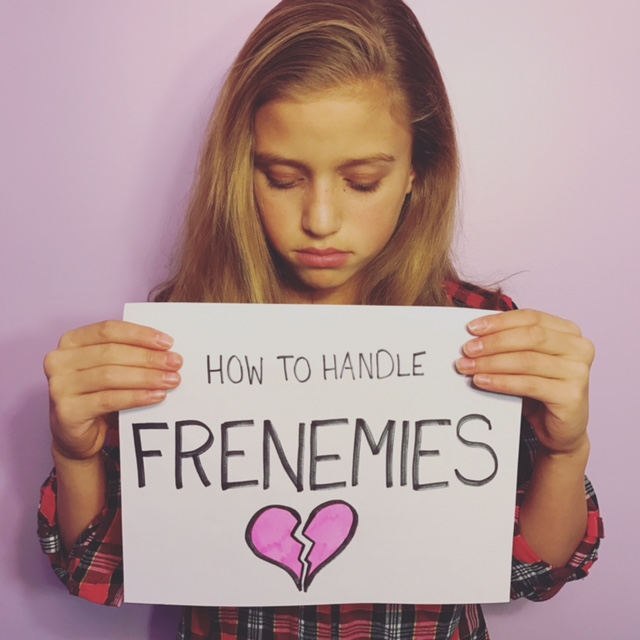
Frenemies: Solving a Sticky Situation
It can be difficult to determine who is a friend and who is not.
November 7, 2016
Friends come and go in life. Times can be tough, and everyone goes through them at some point in life, but there are ways to ease the anger and possibly avoid it entirely. Here is a complete guide on how to deal with frenemies.
First of all, it’s important to define a friend. According to google.com, a friend is “A person whom one knows and with whom one has a bond of mutual affection, typically exclusive of sexual or family relation,” The definition of “friend” is very vague and is often misinterpreted as “acquaintance”. A friend is someone who is emotionally relatable, whereas an acquaintance is simply someone who is known, but not connected with on a deep or emotional level. Of course, most people go through a stage where friends change and come and go. The dictionary defines this change in friendship as a “frenemy”- someone who pretends to be a friend to reap the benefits, but does not reciprocate the affection and support. However, it can be difficult to determine when it’s time to say goodbye.
If someone is being bothersome and it is having an obvious negative effect, it is time to stand up and face the issue. Remaining silent will only cause guilt and regret as the problem persists. People will usually ask an opinion on a topic if they want advice, but unsolicited advice is rarely welcome, so be cautious when voicing concerns.
It is important to reach out to a friend in a situation where they are making poor and permanent decisions in the friendship. If they are considering drastic, life-changing actions, speak up and be there for support. However, this does not give them the right to dump all of their weight onto other peoples’ shoulders. Unfortunately, this could mean the end of a friendship, or at least for quite some time until they realize the benefits to the advice. It takes time for ideas to settle and friends sometimes have a difficult time seeing the truth. Don’t expect things to change overnight. Recovery takes time, but eventually, they will realize that the advice was given out of love, not criticism. If it’s a good friendship, it will survive.
If nothing changes, this friendship is not going to work. No one is obligated to stay in a negative friendship, especially if it’s causing harm. If they ditch plans, avoid company, and constantly find ways to change the plans, then end the friendship and feel no guilt whatsoever. If the friend is too clingy, set boundaries, like only hanging out a handful of times per month. It’s a non-offensive way to send the “I need space” message without actually saying anything of the sort. If the issue is simply that they are a boring friend, that is better left unsaid. It will only hurt their feelings and does not establish a solution. However, if there is an issue that is really nagging on the friendship, address it politely and concisely.
There are several types of frenemies, so it can be hard sometimes to determine if a friend has turned the switch off on a friendship. If someone hangs out with another to make themself feel better about their own life, this is a frenemy. There is not a balance of emotional or supportive benefits. Here are the “Seven Dwarfs of Frenemies”, as described by author Kelly Williams Brown, the author of “Adulting”:

- Flaky: This kind of frenemy constantly changes the plans, and all too often, never reschedules.
- Flirty: This frenemy takes a liking to the significant other of their friend. This person will likely jostle them every few minutes, but deny any flirting when confronted.
- Boasty: This is the kind of frenemy who boasts about their accomplishments but phrases it as a complaint so that they are provided with “comfort” from their supportive friends.
- Crabby: They just can’t be happy about anything. This frenemy complains non stop and never likes anything.
- Backstabby: This frenemy can’t get enough of you, unless you are in the way of something he or she wants.
- Underminey: This frenemy doesn’t provide positive reinforcement or compliments. If they do, it’s half-hearted and they don’t mean what they say.
- Doc: This frenemy is the doctor. She diagnoses all of the problems and comes up with incredible cures that will definitely not help the situation. She “knows exactly what that friend is going through” and isn’t shy about her opinions on the matter.
If any of these categories apply to a present friendship in life, it may be time to take a second look at how beneficial this friendship actually is. It’s okay to take time on making these decisions, but weigh what’s best for emotional health and support when it comes to keeping a friend around.
Juniors Emily Palmer and Morgan Bennett share their views on how to deal with a not-so-good friend.
“First, you should speak with the person to try and identify the problem and if it can be fixed. If it can’t be fixed, try and focus on spending time with the friends who are supportive and not the ones who pull you down,” said Palmer.
Bennett agrees about spending time with encouraging companions.
“If you really want to stay friends with them, see if both of you can work it out,” said Bennett. “If you don’t care too much, find a different friend who helps you and encourages you.”
When deciding on the worth of a friendship, remember that it’s important to be surrounded by people who will provide encouragement and support. Determine what’s more important: a wishy-washy friendship or a happy lifestyle.


